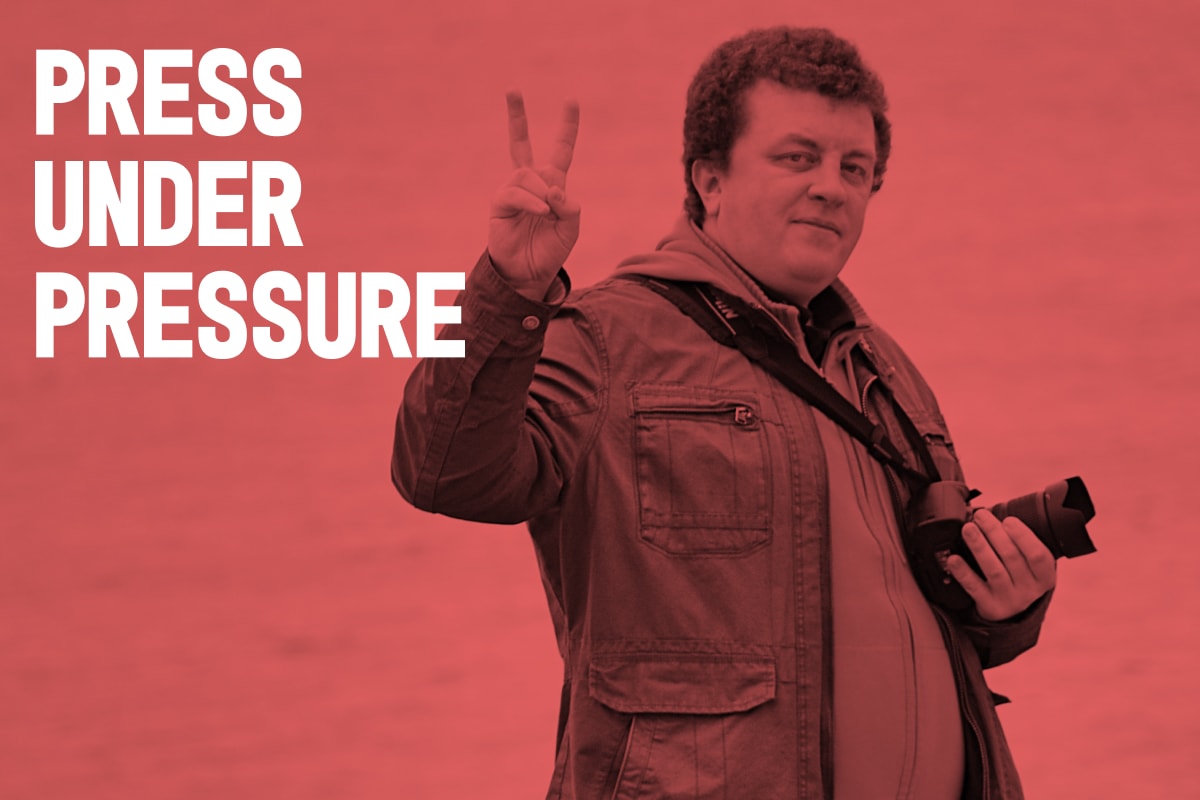
Andrei Aliaksandrau, Belarusian journalist and media manager. Friends and colleagues tell his story.
The Ministry of Internal affairs started a case under Article 342 Part 2 of the Criminal Code (Organisation and preparation of actions in gross violation of public order). Yet on June 30, 2021 Andrei Aliaksandrau was accused additionally under Article 356 Part 1 of the Criminal Code – treason.
Belarusian human rights organisations have recognised Aliaksandrau and Zlobina as political prisoners.
On September 1, 2022 Andrei Aliaksandrau and Iryna Zlobina got married at SIZO-1 (pre-trial detention center). And on October 6, 2022 at Minsk regional court a sentence was given on «the BelaPAN case» [BelaPAN is the largest and the oldest independent information agency in Belarus. It was recognized as an extremist formation under the KGB (the Committee for State Security) decision in November, 2021], in which Aliaksandrau and Zlobina were involved. Andrei Aliaksandrau was condemned to 14 years of reinforced regime colony, Iryna Zlobina – to 9 years of general regime colony. The legal proceedings were closed.
Besides, Aliaksandrau was accused of income tax evasion from February, 2015 to April, 2021. The political prisoner must pay a fine at the amount of 32,000 BYN (about 12,700 USD).
Andrei Aliaksandrau and Iryna Zlobina also were accused of training persons to participate in group actions that grossly violate the public order – just so the investigation estimated the payments of fines and lawyers’ services to those Belarusians who were detained in the course of actions in 2020. Aiding the By_help foundation and its representatives was considered by Belarusian authorities as an activity aimed on inflicting harm on national security and qualified as high treason.
On January 20, 2023, the Ministry of Internal Affairs added Aliaksandrau and Zlobina to the list of persons involved in extremist activities.

I met Andrei for the first time about 15 years ago when I worked at the Belarusian editorial office of the Trud [Labour] newspaper. He used to write for us periodically from Navapolack [a city in northern Belarus]. Despite being born in Nizhny Tagil [a Russian city in the Urals] – Andrei’s father served in various military structures – Andrei considers Minsk his hometown. He spent his childhood, youth and a part of his adult life here. I believe he has a particularly good feeling about this city.
In Navapolack, he worked in television and at a private newspaper, The Chemist. It was still possible back in the 2000s: there was enough independent press, including printed media, in regional centres. In 2005-2006, the authorities started to put pressure on the independent mass media, looking for formal pretexts to liquidate publications. And in the end, The Chemist’s editorial office was forbidden to distribute their print runs through the state-owned distribution network.
Despite this, and even after moving from Navapolack to Minsk, Andrei continued to work on the project online, and maintained The Chemist website. That was his way of supporting his town and the journalists’ work.

Andrei Aliaksandrau. Photo by Kanstantsin Lashkevich
We got better acquainted with Andrei when he worked at the Belarusian Association of Journalists. He was in charge of international relations as the Deputy Chairman of the Association. Andrei is a talented organiser, a person who knows how to make important, useful and – crucially – effective contacts in the international arena.
He is capable of clearly informing the global community about the problems Belarusian journalists and civil society are facing. Andrei has good friends among journalists and politicians of almost all European countries and he has kept up these relations for many years now.
In 2011, Andrei won a prestigious Chevening Scholarship from the Foreign, Commonwealth and Development Office of Great Britain. He chose to pursue a master’s degree at the University of Westminster, famous for its School of Media and Communications, and the strong teaching staff and progressive curriculum. He studied media management — which made this topic a key one for him. Andrei decided he had to learn the topic thoroughly from a scientific point of view, learn from other professionals, get international experience; and then apply this knowledge in practice in Belarus, and share it with others.
After completing his scholarship, Andrei worked at the London offices of the human rights organisations Censorship and Article 19. It was a great achievement that he got to work there without British citizenship, for the competition is huge and lots of people dream of working there. Andrei covered the post-Soviet space for these organisations.
Back then, in London, he was already thinking about how best to apply his experience in Belarus. He had the opportunity to stay in Great Britain and work in prestigious organisations. But he is a true patriot, and these are not just empty words: they are backed up by real deeds.
Andrei only ever considered one option: to return to Belarus and work in the Belarusian media.
I spent about two years together with Andrei in London. We lived at the Belarusian Religious and Cultural Centre in the north of the city, for a long time headed by the legendary Father Aliaksandar Nadsan. Many of our meetings were dedicated to the faith of the Belarusian media and survival algorithms in an authoritarian state.
Andrei is an instigator, a leader, the life of any party. He is optimistic, positive-minded, and has a fine sense of humor. Andrei managed to cheer everyone up, keep them positive, keep them from drowning in depressing thoughts. And people have always valued that! Not only Belarusians, but the British as well, along with his multi-national university group.
His fellow students called him Mr. President half jokingly, half seriously. He could charm and inspire not only young people, but those much older than himself.
He was everywhere in his element. Andrei’s intelligence, vast knowledge, and excellent English helped him fit into any company.
When Russia occupied Crimea and the war in the Ukraine broke out, Andrei was very depressed. He was hurt and could not just stand aside and watch. We joined support rallies in London organised by the Ukrainian diaspora. And soon Andrei found a way to realise a project – a documentary about the events in the Ukraine, in Donbass in particular. And he left his good and safe work in London to make this film with his Ukrainian colleagues. His departure was logical to me, yet I was surprised by how quickly he abandoned his peaceful life in London and headed off to the very heart of events.
Later, after an invitation from Ales Lipai [founder and director of the BelaPAN information agency – ed. note] Andrei returned to Belarus and joined the only independent information agency, BelaPAN. This period was another interesting one for Andrei: he used the opportunity to apply his knowledge on how to monetise Belarusian mass media. He held on to the idea of creating a successful and respected mass information outlet in Belarus. How to make BelaPAN more profitable and stable – these were the issues Andrei focused on while working at the agency.
Andrei was good friends with Ales Lipai as well. They had similar professional ambitions, loved journalism and loved Belarus. They both were poets and enthusiastic photographers. Ales’ death was a grave tragedy for Andrei, and though he grieved deeply, he kept it to himself and rarely talked to anyone about it. For quite some time, he seemed a little lost.
Andrei took over many responsibilities for the development of the agency after Ales died. He continued to make contacts, kept in touch with partners, and built business models. He was eager to keep the media company – quite a large one for Belarus – afloat. Keep it and develop it. And I think he succeeded.
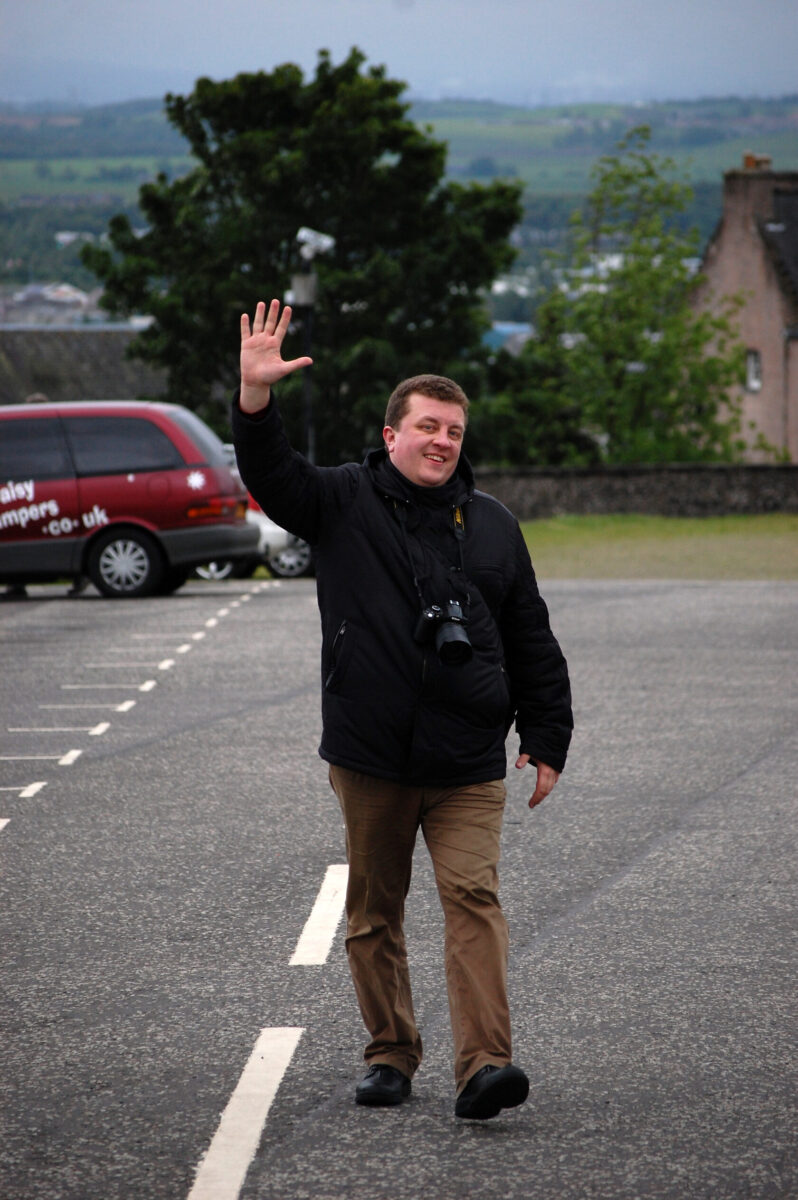
Andrei Aliaksandrau. Photo by Kanstantsin Lashkevich
And he was engaged in other projects at the same time. He created the Belarusian Journal, an intellectual online media designed to cultivate and develop free and independent Belarusian thought. It brought together different ideas, thoughts and opinions – often completely in opposition to each other.
For many years, Andrei took part in projects led by the methodologist and philosopher Vladimir Matskievich. It has been a long-term theoretical work in public education and on developing civil society.
Andrei has a structured, systematic way of thinking. He always looks to the future when coming up with and implementing his projects. He tries to programme them for several years ahead at once, forecasting results to understand which outcome would be truly helpful for the country and society.
Andrei is a man of incredibly many talents.
He can be equally successful in managing a media company, creating business plans, designing projects, writing as a journalist and performing in front of any audience.
Not many people know that Andrei plays the piano. In the house we lived in, in London, there was an old grand piano. Once Andrei came to it and started playing some melody. I was very surprised. The next day he played something nice again and I asked what it was, and he said, ‘I just thought it up. Later Andrei bought himself a piano keyboard to play and compose with a laptop. And he kept doing it in his spare time in Minsk.
Andrei also writes poems in Belarusian. It is an important part of his identity. He has a lot of respect for the Belarusian language. It is a part of his personality. He is deeply Belarus-centric.
His soul is here, in Belarus. He could have lived and fulfilled his potential successfully in any country of the world, but it was important for him to live and work in Belarus.
There is a popular musical group in the Ukraine, Kolir. They set to music one of Andrei’s poems, Spare Me the Right, and made a recording under the same name. To be honest, it is sort of Andrei’s life manifesto. While reading this poem, one can see Andrei himself, in his essence.

I’ve been in mass media for a long time, but only met Andrei in 2016. A media management training programme had been launched in Belarus and we were involved in it as coaches.
Aliaksandrau is a man of whom I had only a superficial knowledge, based on his vivid and sometimes scandalous Facebook style. Yet it turned out that such an unusual manner for a media manager sits well alongside sharp critical thinking and working efficiency. Plus, Andrei has had strong academic training which is rare in our sphere. It is often the case that ‘field’ professionals struggle to step outside the frame of their personal experience, and cannot manage to work consistently with their audience in an educational format or as a consultant.
In addition, he is a genuine practitioner who strives to prove every idea with action. His Belarusian Journal is an intellectual resource for those who have managed to escape the ‘matrix’. There is expertise here, prominent personalities, great authors and an invested audience. A circle of the intellectual elite has formed around the Journal. It was, perhaps, the very ‘thing for the soul’ that one can always find room for. I hope he will soon continue working on the Journal and the publication will live on.
Our communication was basically built on management and discussions about the materials published in the Journal. We are now engaged in several educational projects as co-coaches.
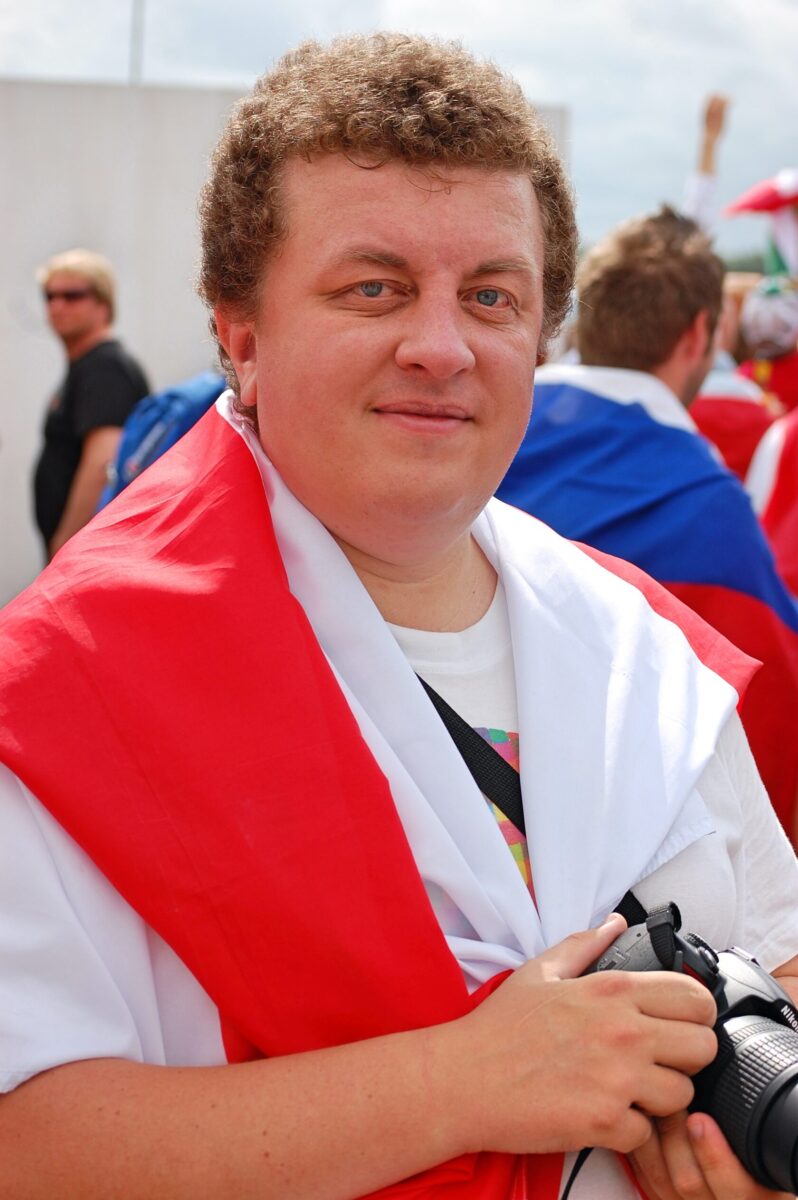
Andrei Aliaksandrau. Photo by Kanstantsin Lashkevich
Our work together started with a story from training. We were at a training for coaches where we learned various approaches and methods including team building and leadership. We had to assemble a picture with geometric figures, in pairs. One member of the pair had an ‘example’, which he was not allowed to name, and the other had a set of squares and triangles. Well, we managed to do our ‘dolphin’ very quickly! The word later became a saying: ‘send the dolphin into a group’ meant to see how well a team has built up.
Once, we talked about that story and our impressions of each other. I had thought, ‘That’s quite some calm and focused person’. Andrei said his impression was, ‘Malishevskaya is about efficiency, so we’ll make a team’.
Andrei is super-communicative. It sometimes prevents one from seeing how exacting he is. When coaches work in a pair, one is always a good cop and another a bad one. The roles are flexible, but still.
In December 2002, completing training with one of the groups, we received very characteristic feedback. Participants of the project shared their impressions.
‘During the first training module, it seemed Galina was the rough and demanding one and Andrei was kind and tolerant. But after the second and the third modules, we understood everything was actually the opposite…’
Media managers are often former journalists. We have many times seen proof that on becoming a manager people face quite serious mental obstacles and refuse to give up on their illusions, or reporter’s idealism. This ‘break and go over to the dark side’ was what Andrei worked on with the group: he ‘messed’ with the newly-appointed managers’ brains, and brought out ‘the dark side’ of management. Which is based on strategic clarity and operational efficiency, both short-term and long-term.
Andrei has a ‘thing’: at the end of the whole training programme, after the final group project presentations are delivered and the winners announced, he gives an inspiring speech. And it always works. He says, there is no ‘dark side’ actually, but in order to see this, one has to complete the whole media management training course and feel for oneself all the pain and responsibility of a media manager, including the work with Excel tables, budgets, and marketing analysis… All of these are complicated and journalists don’t like them. Yet such brain ‘recoding’ is necessary. It is a sort of initiation, joining the ‘dark side’ to willingly return to the ‘bright side’ later. Andrei Aliaksandrau is very good at this meta-setting.
I’d like to note another thing. Andrei as a coach and consultant is in very high demand. He has worked in various media markets: Ukraine, Georgia, Uzbekistan and Lebanon. Having such experience and expertise, a comprehensive view of the industry is formed.
Thanks to this, he is capable of organising processes others don’t even start thinking about. It is indeed his unique talent.
By the way, Andrei has a fine-tuned intuition when it comes to people. People always gather, and interests and ideas keep swirling around him.
Everyone we have ever worked with in training has always given emotional feedback and shown good results. For example, there is a mandatory daily routine in which each group (two or three people) have to present the next day the most valuable and important things they remember from the previous day. In order to ‘anchor’ the material studied, so to say. These groups are usually very creative and humorous because people open up easily. I have saved a video of one of these groups: it lifts the spirits and stops me sinking into despair at the current situation.
The point is that everything Andrei Aliaksandrau does he does with humour. He is a walking force for humour and positivity. He can ‘sell’ even complex topics easily and accessibly. He is capable of motivating people, and giving them the assurance that they can manage a task.

I met Andrei Aliaksandrau in late 2014. Before that, I only knew about him from BelaPAN articles. When I saw him for the first time in person, the first thing I noted – and which always helps him win everybody’s favour – was his excellent sense of humour: ironic, fine, sharp-minded.
We met once more after that. The thing was, I had an idea to celebrate New Year on a football field. It was realised in 2015. I offered Andrei a game and he agreed gladly. I have been a Liverpool fan for 25 years. So I came to that game wearing the red Liverpool t-shirt. How surprised and glad I was when I saw him wearing just the same shirt. His was personalised, with his name on the back. I vividly remember how I approached him and said, ‘We’ll make a good team’.

Dmitry Navazhylau and Andrei Aliaksandrau. Photo provided by Dmitry Navazhylau
And so it happened. Liverpool united us and made us friends. We devoted a fair amount of time at our meetings to football: how did the team play, what was happening, what had changed. I shared my discoveries and Andrei, who is fluent in English, and had always brought news from The Guardian on the matter. June 1, 2019, we watched the Champions League finals together, Liverpool vs. Tottenham. And that moment was not about friendship, but rather about brotherhood.
You don’t have to ask, he is always on the frontline, always a volunteer. He is pained by injustice, by everything that has and continues to happen in our country.
As for the workflow at BelaPAN, it was absolutely non-conflict, without issues. Neither of us tried to feed off the other, or step on the other’s toes. We have never been competitors: we shared a common cause. When Andrei was a Deputy Director of BelaPAN, I was also a Deputy Director of BelaPAN. We were mutually complementary, so even minor issues didn’t arise even once.
It was very comfortable to work with Andrei, as well as interesting and extremely useful. He is a professional of the highest qualification. His experience in media management is priceless. I learned from him, especially in the field of editorial office administration and management.
In addition to all of that, his personal qualities: he is always self-confident and he passes on this confidence to his colleagues. Any complex situation is solved with a smile and a joke.
His characteristic feature is that he never gives in to despair, never complains, ‘oh, oh, what’s it going to be, what might happen?’
Andrei is the main driving force. He is full of energy and ideas. And I can’t but share one story important for each and every BelaPAN staffer: when Ales Lipai died, Andrei undertook the collection of donations for Ales’ memorial. More than 300 people donated and it was truly a people’s memorial for Ales Lipai. And it was a really important undertaking because Ales’s family was not left alone and people had the chance to embody their gratitude to Ales by adding their share to the creation of the memorial. And so Andrei did all the work and undertook all the effort to have this memorial made. The memorial exists thanks to the personal merit of Andrei Aliaksandrau.

We have been friends with Andrei for a very long time. We got to know each other through another good friend of ours, Sergei Vozniak. Andrei and Sergei became friends during one of their trips abroad. And Sergei and I were working on the Tovarisch newspaper. Once Andrei came to our editorial office, and that’s how we met.
One of Andrei’s characteristic features is that he shows himself for what he is at once.
For the whole time we have been friends I have never seen him showing off, trying to make people like him.
We got along not only due to professional interests, but because of sports as well. First of all, the English Premier League. And when Andrei said he supported Liverpool, I coughed in my fist: ‘And I Chelsea!’ The most interesting thing is that Andrei brought me a Chelsea flag from London. I remember he said back then, ‘Dimulik, it’s very unusual for me to finance Liverpool’s competitor, but I decided to do it’. The thing is that Andrei is not only a devoted fan of Liverpool, he is also an official member of the Liverpool fan movement. For me, this is telling.
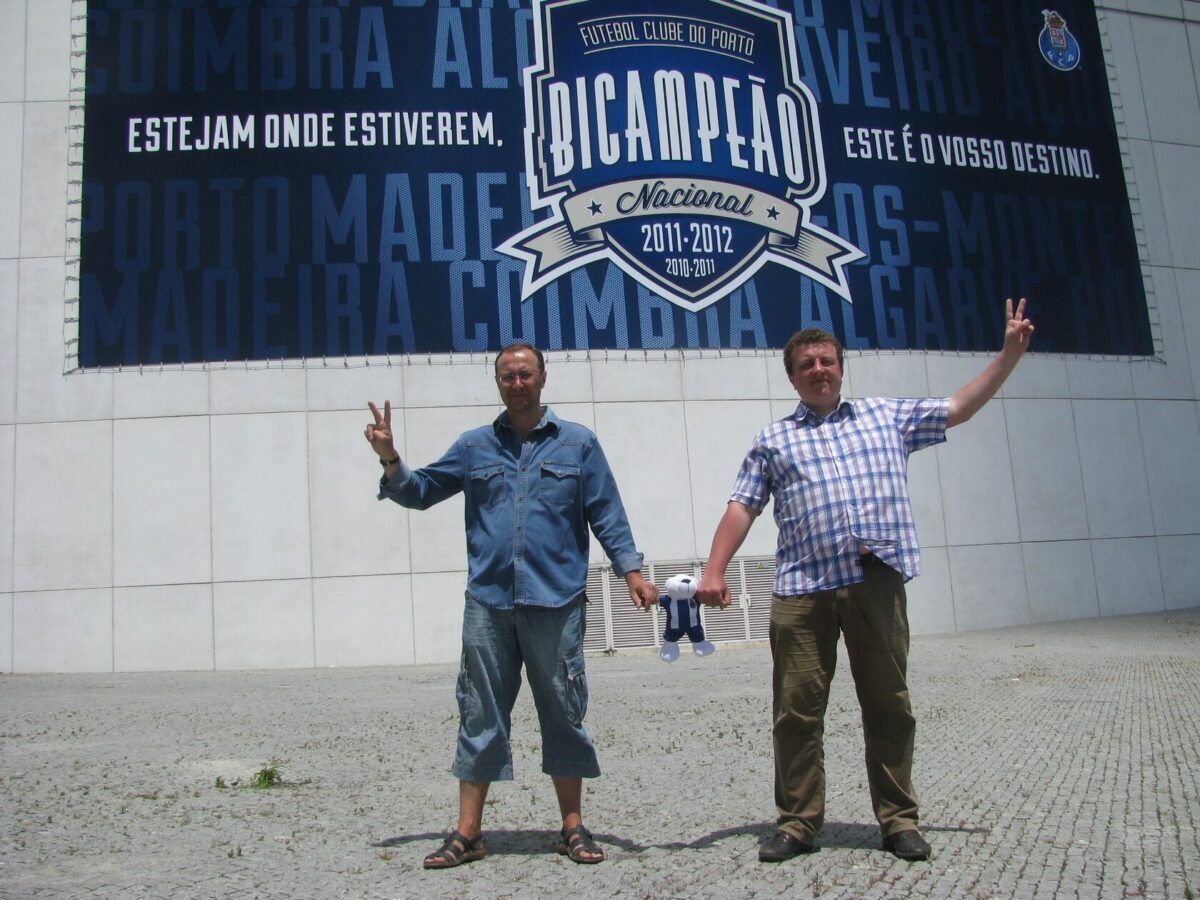
Andrei Aliaksandrau and Dmitry Yanenka. Photo provided by Dmitry Yanenka
We worked on several journalism projects together with Andrei. He is indeed a strong media manager. And what’s important, he never mixed up friendship and work. We could argue, including with strong words, about work issues, but there was no place for personal attacks: our work arguments never affected our friendship. Besides, his advice on work has never been without value, which I’ve seen proof of many times. If Andrei saw how work could be done better, he would say so.
I could disagree at once, yet practice showed eventually that Andrei’s recommendations only improved the performance of the projects.
When Andrei started to work at BelaPAN he invited me there as well. I had a meeting with Ales Lipai for which Andrei gave me the best reference, and Ales offered me a position at the information agency.
We are friends both individually and as families. Andrei was at my wedding. We celebrate birthdays together. I can count all my friends on one hand. Andrei is among them.
Andrei always says about me and Sergei Vozniak, ‘I have two best friends, and they’re both communists’. He usually jokes about how this could happen to him at all. But our different political opinions have never been a problem. We never even talk about political or ideological issues — we have plenty of other topics to discuss.
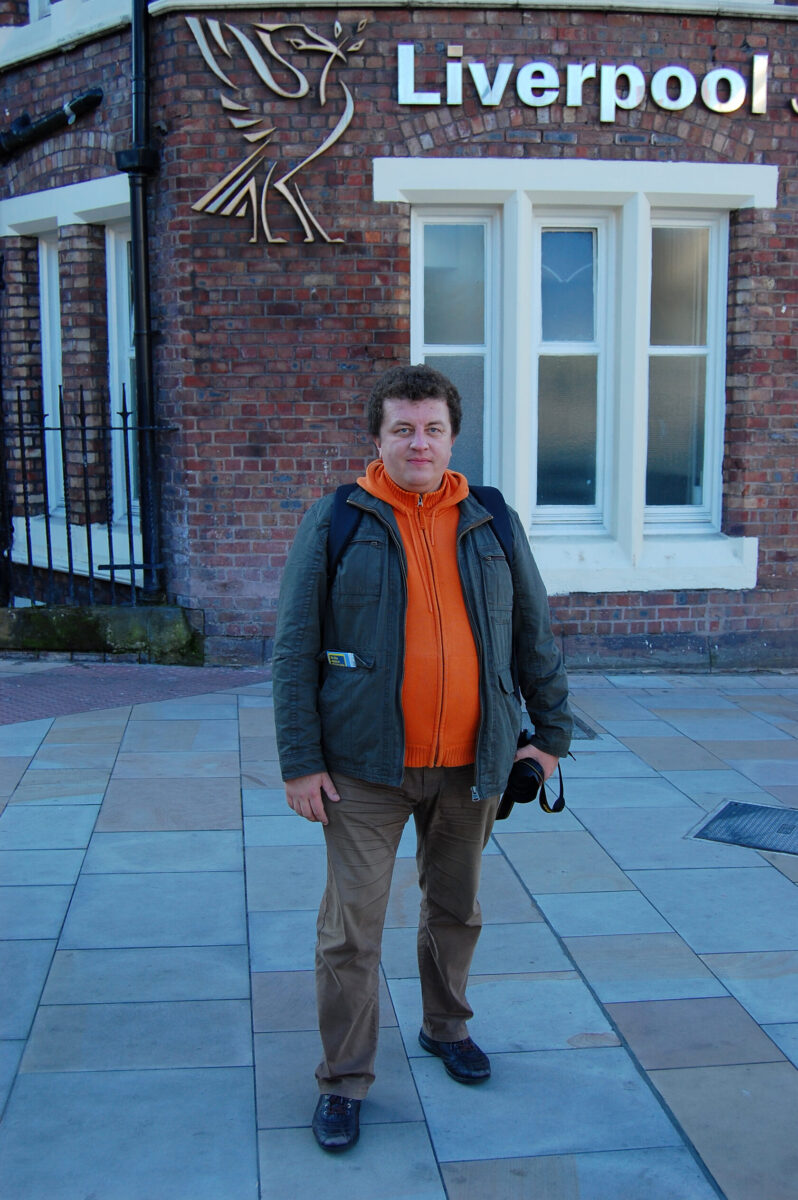
Andrei Aliaksandrau. Photo by Kanstantsin Lashkevich
A funny story once happened to us. The Lithuanian Union of Journalists held an annual sports event inviting colleagues from different countries to participate. We took part as members of the Belarusian Association of Journalists many times. At one of these sports events we played streetball. It was the very beginning of our game with the Latvians. I was keeping the goal. Five minutes passed, and I got injured – ruptured ligament in my knee. I was replaced by Sergei Vozniak. In literally 10 minutes, he broke his arm returning a flying ball. He was urgently taken to hospital. At that very time, Aliaksandrau finished his basketball game and came to support us. He came but we were not there, and he was immediately put in goal because there was nobody else to play. On our way back to the Belarussian border, the officers at passport control looked at us – wearing bandages and plaster – and joked it was not a sports event, but the Paralympics. Since then, we have often recalled that game.
There are no guarded statements between us: we can always speak plainly with each other, especially at work. There is no keeping to ourselves or holding grudges: there is dialogue and trust. It is also one of Andrei’s qualities: he knows how to build comfortable relations, both professional and personal.
When the news broke that Andrei had been detained it was a shock for all of us, his friends and acquaintances. Andrei is an absolutely honest person: in financial and other issues. So everything happening now is surreal. I am 100% sure that Andrei has done nothing that could harm Belarus. He has been and still is an honest and honourable man.
Terms and conditions
Partial or full reprint is permitted subject to following terms of use.
An active direct hyperlink to the original publication is required. The link must be placed in the header of the reprinted material, in the lead or the first paragraph.
Reprints, whether in full or in part, must not make changes to the text, titles, or copyrighted photographs.
When reprinting materials from this page, attribution must be given to the Press Club Belarus “Press under Pressure” project, collecting evidence of repression against independent media and journalists in Belarus.